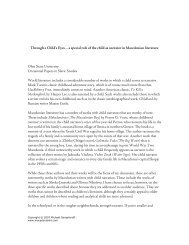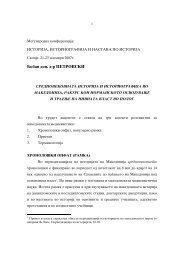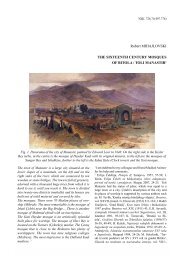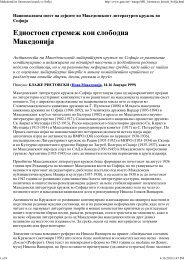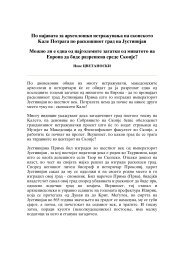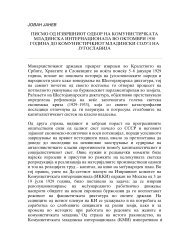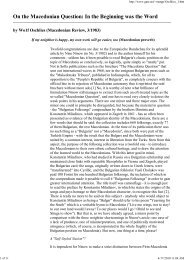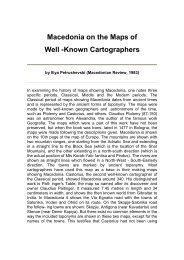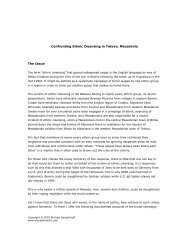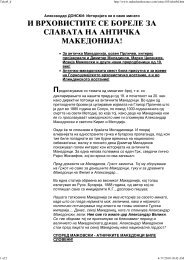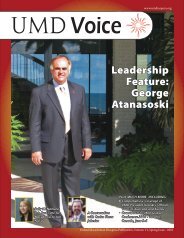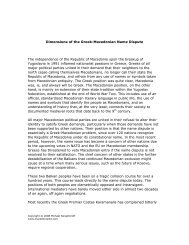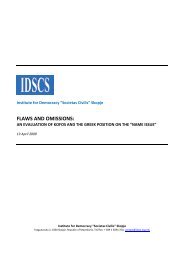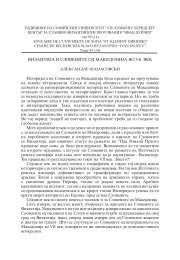Macedonian State-National Concepts and ... - Makedonika
Macedonian State-National Concepts and ... - Makedonika
Macedonian State-National Concepts and ... - Makedonika
You also want an ePaper? Increase the reach of your titles
YUMPU automatically turns print PDFs into web optimized ePapers that Google loves.
neither Serbian nor Bulgarian ideas, but <strong>Macedonian</strong> ones. Whoever wants to<br />
discuss autonomy should do this with the <strong>Macedonian</strong>s <strong>and</strong> with no one else.”<br />
This activity was suppressed in 1905, but the idea continued its development.<br />
It was not by chance that Grigorije HadÔitaškoviÚ in 1917 became the proponent<br />
of a genuine south-Slav platform in the Voden Declaration, <strong>and</strong> in the next year<br />
he travelled as far as Corfu in order to explain his concepts, in a special<br />
Promemoria, to PašiÚ’s government, although everyone once again refused to hear<br />
the voice of the <strong>Macedonian</strong>.<br />
5.<br />
We still do not know much about the ‘Russian Party in the Bitola region’ in<br />
1910, <strong>and</strong> there is no detailed research on the activity of Marko A. MuševiÌ <strong>and</strong><br />
his mission to Russia at that period, when a special Memor<strong>and</strong>um to the Russian<br />
Government <strong>and</strong> the Russian Church was submitted. Nor do we know very<br />
much about the missions of Krste Misirkov in 1909 <strong>and</strong> of Dimitrija Ëupovski in<br />
1911 in Macedonia. Yet we know a great deal about the establishment <strong>and</strong> concepts<br />
of the Ss Cyril <strong>and</strong> Methodius Slavonic-<strong>Macedonian</strong> <strong>National</strong> <strong>and</strong> Educational<br />
Society in St Petersburg from June 27, 1912 onwards, whose Article 31 of<br />
its Constitution considered “the Slavonic-<strong>Macedonian</strong> language as the spoken <strong>and</strong><br />
written language”; <strong>and</strong> about the concepts of the Bitola Circle expressed in its act<br />
of August 15, 1912, <strong>and</strong> also about the presentations of Ëupovski, Dimov, Dr<br />
KonstantinoviÌ <strong>and</strong> others in the Russian capital, <strong>and</strong> their warnings that “in<br />
Macedonia it smells of death” <strong>and</strong> their anticipation of future historical events.<br />
“The victory of the Slavic Alliance, if achieved,” they said, “is absolutely undesirable<br />
from a Slavic point of view, as this will be a requiem for the descendants of<br />
Cyril <strong>and</strong> Methodius: Macedonia will be divided into three parts, there will be a<br />
temporary triumph over its body, but no one will be satisfied, a fight will<br />
unavoidably break out among those who dismembered it <strong>and</strong> there will be no bright<br />
day for the Slavs”, <strong>and</strong> “the outcome will inevitably be a European war <strong>and</strong> the<br />
partition of Macedonia”.<br />
Seeing the speedy preparations for war in the Balkans, in early September 1912,<br />
the <strong>Macedonian</strong>s pointed out: “The <strong>Macedonian</strong>s want political freedom, but<br />
public opinion (the people) in Serbia <strong>and</strong> Bulgaria also wants freedom for<br />
Macedonia, as the <strong>Macedonian</strong>s will then return to their own fatherl<strong>and</strong>. Of course,<br />
there are also aspirations in Bulgaria <strong>and</strong> Serbia to the creation of a Greater<br />
Bulgaria or a Greater Serbia, but this is not the voice of the people.”<br />
The voice of the neighbouring monarchies, however, spoke through the barrels<br />
of the cannons <strong>and</strong> what ensued was what the <strong>Macedonian</strong>s had predicted —<br />
242



